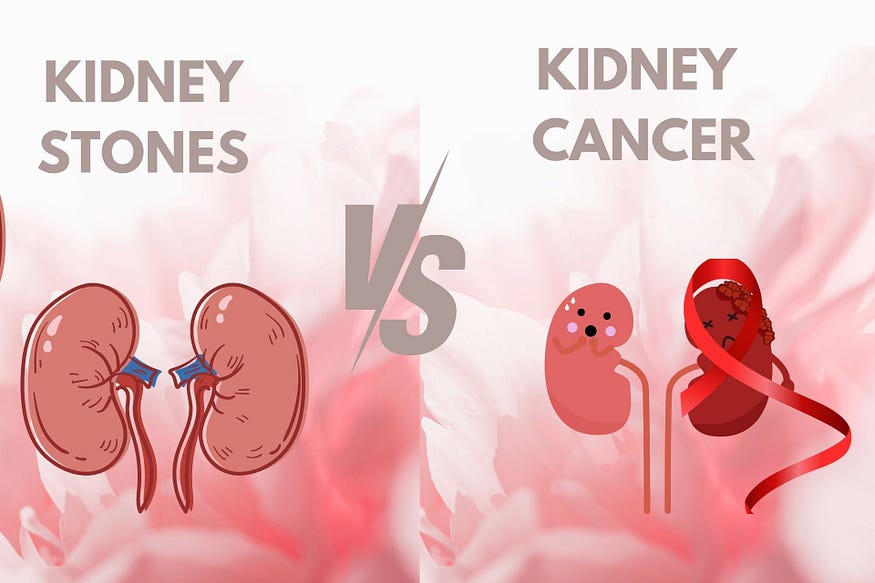Kidney Stones vs. Kidney Cancer: Understanding the Difference

Ever felt a sharp, stabbing pain in your lower back or abdomen? It could be a kidney stone. But sometimes, this pain can be a cause for concern, raising the question: is it kidney cancer? While both conditions can cause similar symptoms, they are fundamentally different. This blog post will serve as a beginner’s guide, explaining the key distinctions between kidney stones and kidney cancer.
Experiencing sharp pain in your lower back? It could be kidney stones or cancer. Learn about the causes, symptoms, and treatment options for both conditions.
Understanding the Kidneys
Before diving into the specifics of kidney stones and kidney cancer, let’s establish a basic understanding of the kidneys themselves. These two bean-shaped organs, located just above your waist on either side of your spine, play a vital role in your body’s filtration system. They remove waste products and excess fluids from your blood, producing urine in the process.
Kidney Stones: A Painful Passage
What are kidney stones?
Kidney stones are hard deposits that form inside your kidneys. These stones are usually composed of mineral and acid salts that crystallize and clump together. Common types of kidney stones include calcium oxalate stones, struvite stones, and uric acid stones.
Several factors can contribute to the formation of kidney stones, including:
- Dehydration: When you don’t drink enough fluids, your urine becomes more concentrated, allowing minerals to crystallize and form stones.
- Diet: A diet high in sodium, oxalate, animal protein, and sugar can increase your risk of developing stones.
- Certain medical conditions: Medical conditions like recurrent urinary tract infections, obesity, and certain bowel diseases can also play a role.
- Family history: If you have a family history of kidney stones, you’re more likely to develop them yourself.
The most common symptom of kidney stones is severe pain in your lower back or abdomen, often radiating to your groin. This pain can come and go in waves and may be accompanied by:
- Painful urination
- Blood in your urine
- Nausea and vomiting
- Frequent urination
- Difficulty passing urine
Treatment of kidney stones:
The treatment for kidney stones depends on the size and location of the stone. Small stones may pass on their own with increased fluid intake and pain medication. For larger stones, urology specialists may recommend procedures like shockwave lithotripsy (using sound waves to break up the stone) or ureteroscopy (inserting a small scope through the urethra to remove the stone).
Kidney Cancer: A Serious Condition
What is kidney cancer?
Kidney cancer is an uncontrolled growth of abnormal cells in the kidneys. These abnormal cells can form a tumor and spread to other parts of the body if left untreated. There are different types of kidney cancer, with renal cell carcinoma being the most common.
Causes of kidney cancer:
The exact cause of kidney cancer is unknown, but certain risk factors can increase your chances of developing it, such as:
- Smoking
- Obesity
- High blood pressure
- Certain genetic conditions
- Exposure to certain chemicals
Symptoms of kidney cancer:
Kidney cancer often doesn’t cause any symptoms in the early stages. However, as the cancer progresses, you may experience:
- Blood in your urine (a painless symptom)
- A lump in your abdomen
- Lower back pain that doesn’t go away
- Unexplained weight loss
- Fatigue
- Anemia
Treatment of kidney cancer:
The treatment for kidney cancer depends on the stage and type of cancer. Treatment options may include surgery to remove the affected kidney or part of it, ablation (using heat or cold to destroy cancer cells), targeted therapy drugs, or immunotherapy.
When to See a Urology Specialist
If you experience any of the following symptoms, it’s crucial to consult a urology specialist:
- Severe pain in your lower back or abdomen
- Blood in your urine
- Difficulty passing urine
- Persistent pain or discomfort in your side
Early diagnosis and treatment are essential for managing both kidney stones and kidney cancer. A urology specialist can perform a thorough evaluation, including urine tests, imaging studies, and biopsies, to diagnose the underlying cause of your symptoms and recommend the most appropriate treatment course.
Living a Kidney-Healthy Life
Here are some tips to promote kidney health and reduce your risk of both kidney stones and kidney cancer:
- Drink plenty of fluids throughout the day to stay hydrated.
- Maintain a healthy diet low in sodium, oxalate, animal protein, and sugar.
- Manage your weight.
- Control your blood pressure.
- Don’t smoke.
- See your doctor for regular checkups, especially if you have any risk factors.
Comments
Post a Comment